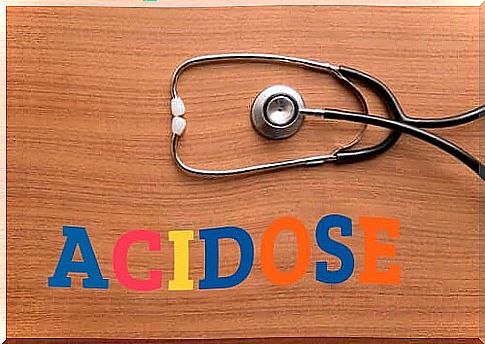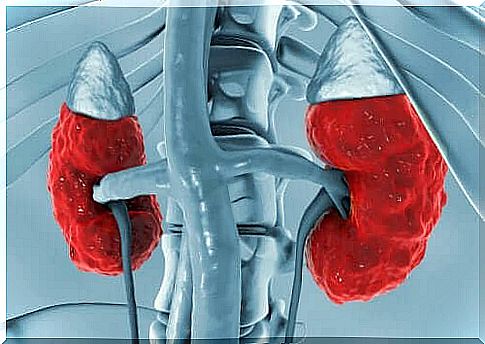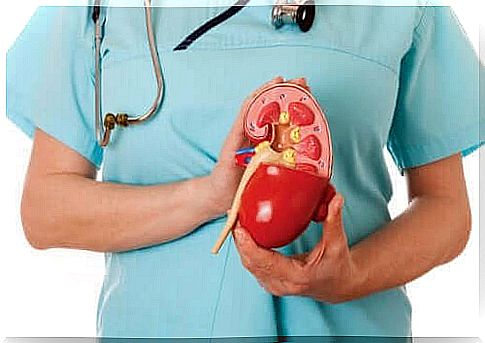Causes Of Proximal Renal Tubular Acidosis

Proximal renal tubular acidosis is caused by the loss of too much bicarbonate from the body. The kidneys also do not eliminate enough of the acids from the blood. The hallmark of this condition is the reduced ability of the proximal tubules to reabsorb glomerular filtrate bicarbonate.
Its prevalence is unknown. However, drug-induced proximal renal tubular acidosis (pRTA) is relatively common, although hereditary proximal renal tubular acidosis is very rare.
Symptoms of Proximal Renal Tubular Acidosis

The symptoms of this condition depend on the underlying disease or condition. This condition causes problems such as:
- rapid breathing
- lethargy
- confusion
In addition, it can lead to shock and even death. It initially manifests as highly alkaline urine due to the unreabsorbed bicarbonate. It may also cause stunted growth and a reduction in bone mineral density.
In some cases, hypokalemia may occur and sometimes some symptoms of periodic paralysis may also occur. However, rickets and osteomalacia are due to vitamin D deficiency and lack of phosphate reabsorption.
Causes
- Renal diseases such as distal renal tubular acidosis and proximal renal tubular acidosis can cause hyperchloremic acidosis.
- It can also manifest in cases of aspirin or ethylene glycol poisoning or methanol poisoning. In addition, severe dehydration can lead to this condition.
- Some drugs may be responsible for the development of acquired proximal renal tubular acidosis.
- People can inherit the condition recessively (in most cases) or dominantly. Acquired renal acidosis is caused by a mutation in the SLC4A4 gene.
However, dominant acidosis is due to mutations in a gene that has not yet been identified. Since the proximal tubules reabsorb approximately 80% of the filtered bicarbonate load, a defect in them leads to a loss of bicarbonate.
Diagnosis of Proximal Renal Tubular Acidosis

Unlike patients with distal renal tubular acidosis, patients with proximal renal tubular acidosis retain the ability to maintain urine pH below 5.5.
To diagnose the disease, a medical professional must demonstrate the lack of bicarbonate reabsorption. A bicarbonate titration test confirms the diagnosis of proximal renal tubular acidosis.
The assessment test demonstrates an exaggerated increase in urinary HCO3 excretion and urinary pH when plasma HCO3 levels rise above the renal threshold. Also , the medical professional should rule out other hereditary proximal tubulopathies such as:
- oculo-cerebro-renal syndrome.
- Dent’s disease.
- glycogen storage diseases due to a GLUT2 deficiency.
With regard to blood tests, the doctor may request an arterial blood gas test and an electrolyte count to confirm or rule out hyperchloremic acidosis.
In addition, they may request a comprehensive metabolic analysis consisting of a number of blood tests that measure sodium and potassium levels, as well as the levels of other chemicals. In addition, they will measure urine pH, urine and blood ketone levels, and lactic acid levels.
This series of tests can therefore help to determine whether the cause of the acidosis is a respiratory disorder or whether there is a metabolic problem after all.
Therapy

Treatment depends on the cause of the disease. Inherited pRTA requires lifelong replacement therapy with bicarbonate. To perform this treatment, doctors need large amounts of bicarbonate to normalize serum bicarbonate.
Sometimes medical professionals prescribe thiazide diuretics, such as hydrochlorothiazide (25-50 mg per day), to improve bicarbonate reabsorption and thereby reduce the amount of bicarbonate needed.
It is also important to monitor plasma potassium. In some cases, the prescription of a mixture of sodium and potassium bicarbonate salts may be necessary.
Normally, drug-induced proximal renal acidosis is reversible upon discontinuation of the drug. With proper treatment , the prognosis for this condition is good.









